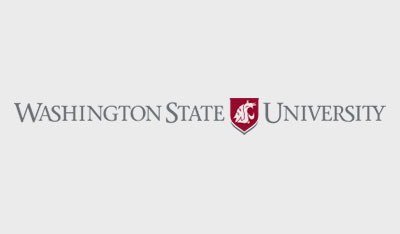Washington State University is a public research university in Pullman, Washington, in the Palouse region of the northwest United States. Founded in 1890, WSU is a land-grant university with programs in chemical engineering, veterinary medicine, agriculture, pharmacy, neuroscience, food science, plant science, mathematics, business, architecture, and communications.

It is ranked in the top 140 universities in America with high research activity, as determined by U.S. News & World Report. It is the second largest institution of higher education in Washington state behind the University of Washington. The university also operates campuses across Washington known as WSU Spokane, WSU Tri-Cities, and WSU Vancouver, all founded in 1989. In 2012, WSU launched an Internet-based Global Campus, which includes its online degree program, WSU Online. These campuses award primarily bachelor's and master's degrees. Freshmen and sophomores were first admitted to the Vancouver campus in 2006 and to the Tri-Cities campus in 2007. Enrollment for the four campuses and WSU Online exceeds 29,686 students. This includes 1,751 international students.
University research strengths/areas of expertise related to activities in Consortium
There are four research and extension centers located in strategic areas of Washington State, and specialized in different topics, all of them with the mission to serve the agricultural, horticultural and natural resources science interest of the state.
- Mount Vernon Northwestern Research and Extension Center is located in the Skagit Valley of northwestern Washington.
- Prosser Irrigated Agriculture Research and Extension Center (IAREC) is the focal point for the University, the U.S. Department of Agriculture - Agricultural Research Service (USDA-ARS), and the Washington State Department of Agriculture (WSDA) research, extension, and certification programs that address the concerns of irrigated agriculture.
- The WSU Puyallup Research and Extension Center combines research, education and community outreach to provide innovative science, knowledge and over 30 programs across our state, country and world.
- Wenatchee Tree Fruit Research and Extension Center, is dedicated to the tree fruit sciences. Located in the primary fruit producing region of the world, the center features a cooperative, multidisciplinary approach to tree fruit production in the 21st century.
Activities with the consortium are mainly focused on academic development, research and extension. These activities include a concept note developed with Universidad de la Salle - Colombia Utopia project, to Build Capacity for Research and Extension in Colombia after the Post-conflict. In conjunction with the Universidad de la Salle, University of New Mexico and University of California Davis, we developed and applied a Rapid Rural Reconnaissance Survey in Bolivar, Sucre and Magdalena Departments in Colombia.
Expertise includes Research and extension in crop physiology, Phenology, Crop modeling and simulation, Decision Support Systems, Data collection, Experimental planning, Data analysis, Impact of climate variability, Agricultural production, Water conservation, and Use of resources for food agriculture.
Consortium subgroup projects
- Rapid Rural Reconnaissance Survey in Bolivar, Sucre and Magdalena Departments in Colombia
Proposals
- From Soil to Grain, From Grain to Country: A Comprehensive Collaboration for a Sustainable Intensification Platform of Colombian Agriculture
University webpage and other relevant links
Coordinating Council Member
Team leader, Interim Leader of the Research Program in AgWeatherNet - Dr. Salazar is an Assistant Research Professor in the Biological Systems Engineering Department; currently she is the Interim Leader of the Research Program of the Agricultural Weather Network. She has over 15 years of experience in research, education, extension and outreach in biology, agricultural engineering, and statistics.


